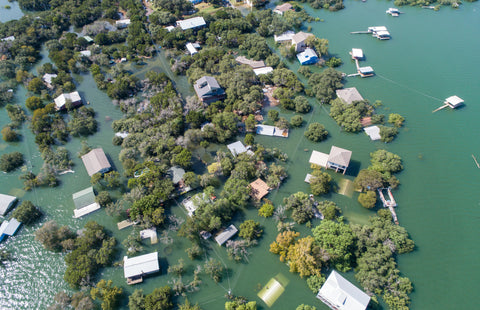
One of the most urgent needs for high quality water filters arises after a flood, when access to clean water may be curtailed or cut off completely. Flooding happens frequently in some areas of the country, including those exposed to hurricanes (the Gulf Coast, Florida, and the American Southeast). However, the massive early summer flooding of 2012 in Duluth, Minnesota, and the colossal impact of Hurricane Sandy on New England in autumn the same year shows that flooding is likely to be much more common everywhere as climate change grows more intense.
When heavy flooding occurs, no water source can be fully trusted until some time has passed and official testing has revealed that it is once again safe. Flooding washes human waste out of sewers and sewage treatment plants, garbage out of trash bins and dumps, and chemicals out of storage tanks or lagoons at factories and waste disposal facilities.
This loathsome “soup” flows into reservoirs, wells, and water pipes, meaning that the water coming out of your tap (assuming that you still have running water after the flood) is very likely contaminated with fecal matter, bacteria, parasites, and a hazardous mix of industrial chemicals, even if it appears normal. You are likely to lose water pressure entirely, forcing you to fall back on drinking collected water to prevent dehydration.
In these circumstances, you can keep yourself, your family, and your pets safe mainly by filtering all the water you drink with a good quality filter. The best filters for these circumstances are passive gravity feed filters, such as the famous Aquacera or Propur line. There are several reasons why passive filters are best for providing clean water after flooding, such as:
- The lack of water pressure means that many filters simply won't work. Undersink filters, including reverse osmosis systems which could clean practically any flooding contamination from the water, do not work in the absence of full water pressure, for example. If your electricity is out, you will get no water from the tap.
- The same is true of diverter valve countertop filters which attach directly to the faucet, and many other types as well. A passive, gravity feed filter works regardless of whether there is water pressure or electricity – add water to the chamber, and the planet's pull will do the rest.
- Water passes through gravity feed filter cartridges at a far more leisurely pace than when it is forced through under pressure. The filtering is correspondingly more intensive, since the water remains in contact with filtration media for more than a split second. This enables full or nearly full removal of all potential contaminants, making the water much safer for you to drink even if it is heavily laden with chemicals and filth prior to filtration.
- Passive filter cartridges typically feature a very high filtration capacity, meaning that they will continue to filter throughout the duration of the emergency, even if it is a week or more before you have access to safe water straight from the tap. Keeping a spare cartridge on hand is always a prudent idea, of course.

